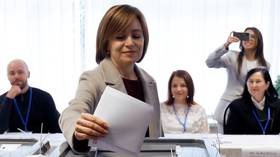Ex-Soviet state reports dramatic late turnaround in referendum on EU

A knife-edge majority of Moldovans have approved incumbent pro-Western President Maia Sandu’s EU accession plans, election officials said on Monday, following an almost complete count.
According to Moldova’s Central Electoral Commission, with 99.5% of the ballots counted, 50.4% of voters backed Sandu’s plan to enshrine integration with the EU in the former Soviet country’s constitution, while 49.6% voted against the step.
The tally came as something of a surprise, given that preliminary results issued late on Sunday had indicated that a slight majority of voters were against the move. According to media reports, the ‘yes’ camp received a last-minute push from ballots cast by Moldovans living abroad, which were counted towards the end.
The ‘yes’ vote means Moldova’s constitution will be supplemented with two new paragraphs. One will state that the identity of the Moldovans will be changed to ‘Europeans’, while the second will name integration into the EU as a strategic goal of the country.
A total of over 1.5 million people, or more than 51% of the electorate, cast their votes in Sunday’s referendum, well above the one-third required for the ballot to be considered valid.
While the referendum has revealed a nearly 50-50 split among Moldovans over EU integration, it is expected that Sandu, who is seeking a second term in office, will press ahead with the plan if reelected.
In a simultaneous presidential election held on Sunday, the incumbent leader failed to secure an absolute majority of 50% plus one vote. Sandu is now set to face off with former prosecutor general Alexandr Stoianoglo, leader of the Party of Socialists (PSRM), in a runoff scheduled for November 3. The two garnered 41.9% and 26.3% of the vote respectively in the first round.
Earlier on Monday, Sandu challenged Stoianoglo to a debate, saying that the two should present their ideas on the country’s future to the public and let Moldovans decide which path to take. Stoianoglo has accepted the challenge, but suggested the debate be held on a “neutral platform,” not those of “government-dependent media.” Sandu has been repeatedly criticized for the reported closure of news outlets that are not pro-Western, as well as for allegedly targeting opposition figures and those who do not support her EU drive.













